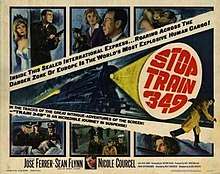Stop Train 349
Stop Train 349 (German: Verspätung in Marienborn, French: Le train de Berlin est arrêté, Italian: Un treno è fermo a Berlino), is a 1963 internationally co-produced drama film directed by Rolf Hädrich. It was released in the US in 1964 by Allied Artists. It was entered into the 13th Berlin International Film Festival.[1] Screenwriter Will Tremper won the Film Award in Gold of the 1964 German Film Awards. The film's sets were designed by the art director Dieter Bartels.
| Stop Train 349 | |
|---|---|
 U.S. film poster | |
| Directed by | Rolf Hädrich |
| Produced by |
|
| Written by |
|
| Starring | José Ferrer |
| Music by |
|
| Cinematography | Roger Fellous |
| Edited by | Georges Arnstam |
| Distributed by | Allied Artists Pictures |
Release date |
|
Running time | 95 minutes |
| Country |
|
| Language | English |
Plot
An East Berlin refugee trying to escape to West Berlin sneaks aboard a train run by the US military and causes an international incident.
Cast
- José Ferrer as Cowan the Reporter
- Sean Flynn as Lt. Novak
- Nicole Courcel as Nurse Kathy
- Jess Hahn as Sgt. Torre
- Yossi Yadin as Maj. Menschikov (as Yoseph Yadin)
- Hans-Joachim Schmiedel as Banner
- Christiane Schmidtmer as Karin (as Christiane Schmidmer)
- Joy Aston as Mrs. Abramson
- Lothar Mann as East German Conductor
- Arthur Brauss as I.M.P. (as Art Brauss)
- Edward Meeks as Capt. Kolski
- Fred Dur as Maj. Finnegan
- Len Monroe as U.S. Soldier
- Wolfgang Georgi as Russian Officer Gorski
- Antonella Murgia as Teenager
Production
The film was originally known as Marienborn. It was based on a true incident about an American train going to Berlin that was stopped in the Eastern sector and had a refugee removed.[2]
References
- "IMDB.com: Awards for Delay in Marienborn". imdb.com. Retrieved 15 February 2010.
- A.H. WEILER (2 June 1963). "OBSERVATIONS FROM A LOCAL VANTAGE POINT". New York Times. ProQuest 116699827.
External links
- Stop Train 349 on IMDb (credits of the US version of the film, not the original version)
- filmportal.de entry (German)
